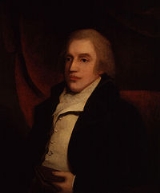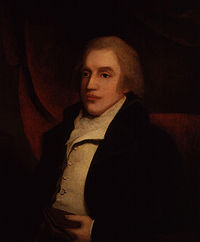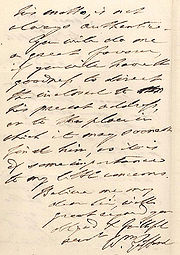
William Gifford
Encyclopedia

Satire
Satire is primarily a literary genre or form, although in practice it can also be found in the graphic and performing arts. In satire, vices, follies, abuses, and shortcomings are held up to ridicule, ideally with the intent of shaming individuals, and society itself, into improvement...
and controversialist.
Life
Gifford was born in Ashburton, Devonshire to Edward Gifford and Elizabeth Cain. His father, a glazierGlazier
A Glazier is a construction professional who selects, cuts, installs, replaces, and removes residential, commercial, and artistic glass. Glaziers also install aluminum storefront frames and entrances, glass handrails and balustrades, shower enclosures, curtain wall framing and glass and mirror...
and house painter, had run away as a youth with vagabond Bampfylde Moore Carew
Bampfylde Moore Carew
Bampfylde Moore Carew was an English rogue, vagabond and impostor, who claimed to be King of the Beggars.He was the son of Reverend Theodore Carew, rector of Bickleigh. The Carews were a well-established Devonshire family. Although they had a reputation for adventurousness, Bampfylde Moore Carew...
, and he remained a carouser throughout his life. He died when William was thirteen; his mother died less than a year later. He was left in the care of a godfather who treated him with little consistency. Gifford was sent in turn to work as a plough boy, a ship's boy, student, and cobbler's apprentice. Of these, Gifford cared only for the life of a student, and he continued to write verses as he learned the cobbler's trade. Gifford’s fortunes changed when his first poetical efforts came to the attention of an Ashburton surgeon, William Cookesley. Cookesley raised a subscription to have the boy's apprenticeship bought out and he returned to school.
By 1779 he had entered Exeter College, Oxford
Exeter College, Oxford
Exeter College is one of the constituent colleges of the University of Oxford in England and the fourth oldest college of the University. The main entrance is on the east side of Turl Street...
as a bible clerk (that is, a servitor
Servitor
In certain universities , a servitor was an undergraduate student who received free accommodation , and was exempted from paying fees for lectures...
), matriculating on 16 February 1779 and graduating B.A. 10 October 1782. Already while at Oxford, he had begun work on his translation of Juvenal. After graduation, he earned the patronage of Lord Grosvenor
Richard Grosvenor, 1st Earl Grosvenor
Richard Grosvenor, 1st Earl Grosvenor , known as Sir Richard Grosvenor, 7th Baronet between 1755 and 1761 and as The Lord Grosvenor between 1761 and 1784, was a British peer, racehorse owner and art collector...
. He spent most of the ensuing decade as tutor to Grosvenor's son. In course of time he produced his first poem, The Baviad (1791), a satire directed against the Della Cruscans
Della Cruscans
The Della Cruscans were a circle of European late-18th-century sentimental poets founded by Robert Merry .- History and influence :...
, a group of sentimental and to Gifford's conservative mentality dangerously radical poets. The Baviad is a 'paraphrastic' (that is, according to the OED, a work having ‘the nature of a paraphrase’) ‘imitation’ of the first satire of the Roman poet Persius (34–62 A.D.). Persius’s satire deals with the degenerate state of contemporary literature. Both literature and literary taste have become corrupt, and for him as for Gifford, poetic corruption mirrors political corruption: the decline in modern poetry reflects the decline of modern morals.
The Baviad was followed by another satire, The Maeviad (1795), against some minor dramatists. His last effort in this line was his Epistle to Peter Pindar (Dr. John Wolcot
John Wolcot
John Wolcot , satirist, born in Dodbrooke, near Kingsbridge in Devon, was educated by an uncle, and studied medicine. In 1767 he went as physician to Sir William Trelawny, Governor of Jamaica, and whom he induced to present him to a Church in the island then vacant, and was ordained in 1769...
) (1800), inspired by personal enmity, which evoked a reply, A Cut at a Cobbler and a public letter in which Wolcot threatened to horse-whip Gifford. Gifford and Wolcot met in Wright’s bookshop in Piccadilly
Piccadilly
Piccadilly is a major street in central London, running from Hyde Park Corner in the west to Piccadilly Circus in the east. It is completely within the city of Westminster. The street is part of the A4 road, London's second most important western artery. St...
on 18 August 1800. According to most contemporary accounts, Wolcot attempted to cudgel Gifford; however, the diminutive but younger satirist wrested his stick from him and proceeded to lay about Wolcot, forcing him to flee down Piccadilly.
The earlier satirical writings had established Gifford as a keen, even ferocious critic, and he was appointed in 1797 editor of the Anti-Jacobin
Anti-Jacobin
The Anti-Jacobin, or, Weekly Examiner was a newspaper founded by George Canning in 1797. William Gifford was its editor. Its first issue was published on 20 November and during the parliamentary session of 1797–98 it was issued every Monday....
, which Canning and his friends had just started, and later of the Quarterly Review
Quarterly Review
The Quarterly Review was a literary and political periodical founded in March 1809 by the well known London publishing house John Murray. It ceased publication in 1967.-Early years:...
(1809–24). As editor of the Anti-Jacobin, Gifford published the pro-Tory satires and parodies of George Canning
George Canning
George Canning PC, FRS was a British statesman and politician who served as Foreign Secretary and briefly Prime Minister.-Early life: 1770–1793:...
, John Hookham Frere
John Hookham Frere
John Hookham Frere PC was an English diplomat and author.Frere was born in London. His father, John Frere, the member of a Suffolk family, had been educated at Caius College, Cambridge, and would have been senior wrangler in 1763 but for the competition of William Paley; his mother, Jane,...
, and George Ellis. Gifford edited The Poetry of the Anti-Jacobin in 1799.
By the turn of the century, Gifford's efforts as a poet were all but over, and he spent the rest of his career as an editor, scholar, and occasional critic. From 1809 to 1824, he edited the Quarterly Review; in this capacity, he became an icon of Tory journalism. Though he contributed rarely, his style marked the periodical in all respects. Gifford was popularly supposed to have penned the attack on Keats's 'Endymion
Endymion (poem)
Endymion is a poem by John Keats first published in 1818. Beginning famously with the line "A thing of beauty is a joy for ever", Endymion, like many epic poems in English , is written in rhyming couplets in iambic pentameter...
' (the review was actually by John Wilson Croker
John Wilson Croker
John Wilson Croker was an Irish statesman and author.He was born at Galway, the only son of John Croker, the surveyor-general of customs and excise in Ireland. He was educated at Trinity College, Dublin, where he graduated in 1800...
), which Percy Bysshe Shelley
Percy Bysshe Shelley
Percy Bysshe Shelley was one of the major English Romantic poets and is critically regarded as among the finest lyric poets in the English language. Shelley was famous for his association with John Keats and Lord Byron...
and Lord Byron erroneously blamed for bringing about the death of the poet, 'snuffed out', in Byron's phrase, 'by an article'. Contributors to the review included Charles Lamb, Walter Scott
Walter Scott
Sir Walter Scott, 1st Baronet was a Scottish historical novelist, playwright, and poet, popular throughout much of the world during his time....
, and Robert Southey
Robert Southey
Robert Southey was an English poet of the Romantic school, one of the so-called "Lake Poets", and Poet Laureate for 30 years from 1813 to his death in 1843...
; the last had been among the poets satirised in the previous decade by the Anti-Jacobin.
His work as translator and editor was only slightly less contentious than his work as editor. The translation of Juvenal, published in 1800 earned high praise. Even William Hazlitt
William Hazlitt
William Hazlitt was an English writer, remembered for his humanistic essays and literary criticism, and as a grammarian and philosopher. He is now considered one of the great critics and essayists of the English language, placed in the company of Samuel Johnson and George Orwell. Yet his work is...
, elsewhere a frank enemy, praised the preface, in which Gifford describes his difficult childhood. This edition remained in print for the next century. Near the end of his life, he produced a translation of Persius. As an editor, Gifford shared the age's interest in Renaissance drama. He brought out editions of Massinger
Philip Massinger
Philip Massinger was an English dramatist. His finely plotted plays, including A New Way to Pay Old Debts, The City Madam and The Roman Actor, are noted for their satire and realism, and their political and social themes.-Early life:The son of Arthur Massinger or Messenger, he was baptized at St....
, Ben Jonson
Ben Jonson
Benjamin Jonson was an English Renaissance dramatist, poet and actor. A contemporary of William Shakespeare, he is best known for his satirical plays, particularly Volpone, The Alchemist, and Bartholomew Fair, which are considered his best, and his lyric poems...
, and Ford
John Ford (dramatist)
John Ford was an English Jacobean and Caroline playwright and poet born in Ilsington in Devon in 1586.-Life and work:...
.
Gifford gave up the editorship of the Quarterly in 1824, only two years before his own death; he was succeeded in that position by John Taylor Coleridge. John Gibson Lockhart
John Gibson Lockhart
John Gibson Lockhart , was a Scottish writer and editor. He is best known as the author of the definitive "Life" of Sir Walter Scott...
took over in 1826.
Gifford never married, although he had a close, probably Platonic, relationship with Ann Davies, a servant; she died in 1815. His salary with the review amounted to nine hundred pounds
Pound sterling
The pound sterling , commonly called the pound, is the official currency of the United Kingdom, its Crown Dependencies and the British Overseas Territories of South Georgia and the South Sandwich Islands, British Antarctic Territory and Tristan da Cunha. It is subdivided into 100 pence...
a year by 1818, and his friendship with various wealthy Tories further insulated him from want. Indeed, when he died his will was proved at 25,000 pounds, the majority of which he bequeathed to the son of Cookesley, his first benefactor.

Work
As a poet, Gifford is commonly judged to have reached his peak with the Baviad. In this work, which led to the more or less complete eclipse of the Della CruscansDella Cruscans
The Della Cruscans were a circle of European late-18th-century sentimental poets founded by Robert Merry .- History and influence :...
, his lifelong tendency to unmoderated invective was restrained (though not completely) to produce a work that effectively satirised the Della Cruscan's sentimentality and tendency to absurd mutual compliment. In later work, his interest in vituperation is judged to have overwhelmed any element of wit. Still, Byron named him the best of the age's satirists. His satires are in heroic couplet
Heroic couplet
A heroic couplet is a traditional form for English poetry, commonly used for epic and narrative poetry; it refers to poems constructed from a sequence of rhyming pairs of iambic pentameter lines. The rhyme is always masculine. Use of the heroic couplet was first pioneered by Geoffrey Chaucer in...
s after the manner of Alexander Pope
Alexander Pope
Alexander Pope was an 18th-century English poet, best known for his satirical verse and for his translation of Homer. He is the third-most frequently quoted writer in The Oxford Dictionary of Quotations, after Shakespeare and Tennyson...
; assorted other verse, little of it memorable, adopts the highly mannered style of the late eighteenth century.
As a critic he had acuteness; but he was one-sided, prejudiced, and savagely bitter, and much more influenced in his judgments by the political opinions than by the literary merits of his victims. These were faults he shared with his querulous and factional time; however, Gifford was among the most virulent practitioners of the art of partisan review. As an editor, he played an important role in the revival of Jonson's reputation after a period of neglect.
His satirical poems are included in volume 4 of British Satire 1785–1840, 5 vols (2003), ed. John Strachan. The Poetry of the Anti-Jacobin was edited by Graeme Stones in 1999 (Pickering and Chatto). Everyman publishes Gifford's Juvenal.
Kathryn Sutherland, professor of the Faculty of English Language and Literature at Oxford University, has studied the manuscript of a discarded chapter of Jane Austen
Jane Austen
Jane Austen was an English novelist whose works of romantic fiction, set among the landed gentry, earned her a place as one of the most widely read writers in English literature, her realism and biting social commentary cementing her historical importance among scholars and critics.Austen lived...
's Persuasion and has conjectured that much of Austen's polished style is probably the result of editorial tidying by Gifford, who worked for the publisher John Murray. There is no direct evidence that Gifford edited the work, however.
Further reading
- [Anon.], “William Gifford”, Annual Biography and Obituary (London: Longman et al., 1828), pp. 159–200.
- [Anon.], “William Gifford”, Annual Register (London, 1827), pp. 490–95.
- [Anon.], “William Gifford”, Gentleman’s Magazine, new ser., 1 (1827), pp. 105–12.
- [Anon.], Catalogue of the Library of the Late William Gifford ... Comprising the Most Rare, Curious, and *Recherche Works Extant, in Theology, History, Antiquities, Classical, and Black Letter Literature, Selected by Himself: Just Received from Europe, and on Sale by William A. Colman (London: n.p., 1829).
- R. B. Clark, William Gifford: Tory Satirist (New York: Columbia University Press, 1930).
- J. Cutmore (ed.), Conservatism and the Quarterly Review: A Critical Analysis (London: Pickering & Chatto, 2007).
- J. Cutmore, Contributors to the Quarterly Review: A History 1809–1825 (London: Pickering & Chatto, 2008).
- M. Gamer, ‘“Bell’s Poetics”: The Baviad, the Della Cruscans, and the Book of The World’ in The Satiric Eye: Forms of Satire in the Romantic Period, ed. S.E. Jones (New York: Palgrave Macmillan, 2003).
- W. Gifford, ‘Introduction’, The Satires of Decimus Junius Juvenalis, trans. W. Gifford (London: G. and W. Nicol, 1802).
- W. Hazlitt, A Letter to William Gifford, Esq. (London: John Miller, 1819).
- B. Keegan, "Cobbling Verse: Shoemaker Poets of the Long Eighteenth Century," The Eighteenth Century: Theory and Interpretation, 42, 3 (Fall 2001): pp. 196–217.
- J. M. Longaker, The Della Cruscans and William Gifford (University of Pennsylvania thesis, 1924).
- S. Smiles, A Publisher and His Friends: Memoir and Correspondence of the Late John Murray, 2nd edn, 2 vols (London: John Murray, 1891).
- J. Strachan (ed.), British Satire 1785–1840, 5 vols. (London: Pickering and Chatto, 2003); vol. 4, Gifford and the Della Cruscans.
- S. Tunnicliffe, ‘A Newly Discovered Source for the Early Life of William Gifford’, The Review of English Studies, n.s. 16, 61 (1965), pp. 25–34.
- K. Wheatley, ‘Conceiving Disgust: Leigh Hunt, William Gifford, and the Quarterly Review’ in Leigh Hunt: Life, Poetics, Politics, ed. N. Roe (London: Routledge, 2003).

